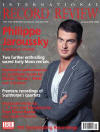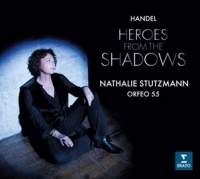Texte paru dans: / Appeared in: |
|
|
Outil de traduction (Très approximatif) |
|
|
Reviewer: Roger
Pines The female contralto is generally accorded the seconda donna (in some cases, the secondo uomo) roles in Handel. It occurred to Nathalie Stutzmann that arias for many of Handel's secondary characters frequently had significant musical treasures to offer. She's put together an excellent disc of this material ‑ much of it unjustly neglected ‑ in which she both sings and conducts, collaborating with Orfeo 55, the splendid chamber orchestra she founded in 2009.
At its best Stutzmann's voice boasts a distinctively grave beauty, in mid‑range resembling on occasion a particularly full-voiced countertenor. It also can show a thickness, even what we used to call a 'fruity' quality, and at the very bottom she booms at times in a jarring, almost Clara‑Butt‑like ‑ manner. On the other hand, she can pull the vibrato out of her sound for expressive purposes, she produces blessedly clean and unaspirated coloratura, and she's entirely persuasive in matters of ornamentation.
Chronologically the arias
extend from Handel's sixth stage work (Agrippina, 1709) to his
fortieth (Serse, 1738). Starting off enjoyably with the villain
Polinesso's surprisingly bouncy 'Dover, giustizia, amor' (Ariodante),
the recital proceeds with Dardano's 'Pena tiranna' (Amadigi di Gaula),
one of the most beautiful and sadly lovelorn of Handelian laments.
Complementing Stutzmann's delicacy here is Handel's wonderful writing for
oboe and bassoon. Next is 'Saro qual vento' (Alessandro), sung by
the sycophant Cleone, with its fabulous wind imagery effectively brought to
life by Stutzmann. 'Non so se sia la speme' (Serse), another lament
from an unhappy lover, is sung by Arsamene, today cast exclusively with
countertenors but premiered by a female voice. The aria doesn't show
Stutzmann to Particular advantage, with some obscured diction in the
plaintive, broken line and hootinesss invading her tone (preferable here are
two eminent countertenors who have recorded this lovely role, David Daniels
and Lawrence Zazzo). The hooty sound also gets in the way later in Alceste's
plaintive 'Son quel stanco pellegrino' (Arianna in Creta),extraordinarily
exposed in its line and unusual in its extensive cello obbligato. A better
bet is Zenobia's 'Son contenta di morire' (Radamisto), where
Stutzmann proves herself a real tiger in her delivery. There's a return to
sombre expression with the wonderful 'Voi che udite il mio lamento' (Agrippina),
with Ottone lamenting the loss of his beloved Poppea. A stabbing chest
tone from the singer is surprisingly effective here, reinforcing Ottone's
agony for the listener. It's an excellent performance, yet here again I
retain a preference for a countertenor sound, confirmed after revisiting the
mesmerizing singing of Michael Chance in Philips's complete recording.
Erato
offers fine engineering, texts and translations. Full synopses are not
included, but David Vickers's hugely valuable essay does contain sufficient
information regarding each aria's dramatic context. An adventurous release,
then, full of welcome discoveries for any Handelian. |
|
|
|
|
|
Cliquez l'un ou l'autre
bouton pour découvrir bien d'autres critiques de CD |
|




